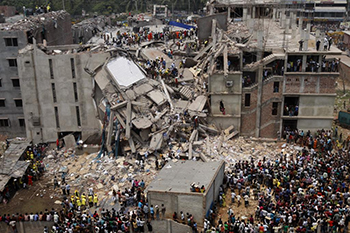 On Wednesday, 24 April 2013 in the Savar Upazila of Dhaka, Bangladesh where an eight-story commercial building named Rana Plaza, collapsed. The search for the dead ended on 13 May 2013 with a death toll of 1,129.
The global apparel industry has been beset by high-profile disasters such as the Rana Plaza factory collapse, civil unrest, poverty wages, long working hours, discrimination and the exploitation of migrant workers. ETI and our members believe that in order to address labour and human rights issues, you must first understand the root cause (be it political, economic, cultural or a mixture of all three) and then to work together to tackle this and drive long-lasting change for workers. In Bangladesh, our programme is focused on social dialogue in garment factories - developing and training unions, Workers’ Participation Committees and management to have better communications, empowering workers to raise and resolve grievances.
On Wednesday, 24 April 2013 in the Savar Upazila of Dhaka, Bangladesh where an eight-story commercial building named Rana Plaza, collapsed. The search for the dead ended on 13 May 2013 with a death toll of 1,129.
The global apparel industry has been beset by high-profile disasters such as the Rana Plaza factory collapse, civil unrest, poverty wages, long working hours, discrimination and the exploitation of migrant workers. ETI and our members believe that in order to address labour and human rights issues, you must first understand the root cause (be it political, economic, cultural or a mixture of all three) and then to work together to tackle this and drive long-lasting change for workers. In Bangladesh, our programme is focused on social dialogue in garment factories - developing and training unions, Workers’ Participation Committees and management to have better communications, empowering workers to raise and resolve grievances.
In South India, we are working to address a number of workers’ rights issues in the spinning mills and garment factories. Our objective is to contribute to the elimination of exploitative practices in the textile industry in Tamil Nadu by implementing a replicable model that promotes ethical recruitment, employment, and the willing retention of workers in the sector. I am delighted that we are now seeing young women working in the mills reporting increased confidence and respect from co-workers and management.
In China, our local office is partnering with brands to deliver productivity and skills training to factories with ILO SCORE, we are also delivering a social dialogue programme in factories in Guangdong.
The tragic Rana Plaza factory collapse, which killed 1100 Bangladeshi factory workers, highlighted the power of collaboration when the international community comes together to respond. The Bangladesh Accord brought together 200 brands and 2 global unions to develop a legally binding approach to address building safety in Bangladesh, and has helped make factories a safer place to work. Indeed, we have seen a paradigm change in terms of the willingness of brands and trade unions to collaborate to address the systemic issues of the industry. This is a new opportunity, as we firmly believe that systemic change will only come when stakeholders work collaboratively to solve the issues of the sector.
I am encouraged to see a new seriousness of international institutions clarifying the responsibilities of transnational corporations through new principles and legislation like the 2011 UN Guiding Principles on Business and Human Rights and the OECD Guidelines on Responsible Due Diligence in Garment Supply Chains. Recently we have seen the ACT Group (Action, Collaboration, Transformation) - a group of 15 brands (many of whom are ETI members)- and the global union IndustriALL sign a Memorandum of Understanding on Living Wages. These are potentially transformative interventions if we can harness the power of collaboration.
Collaboration is not the only approach we need to ensure that governments take responsibility and draft policies and regulations that protect workers sufficiently. In the last year, we have actively lobbied governments and trade associations in countries as diverse as Cambodia, Turkey and Myanmar. I am particularly proud that in June, during the negotiations around the first ever minimum wage for Myanmar, ETI member companies collectively asked the government to reject a proposed exemption for garment workers proposed by the employers association. We were successful, meaning that an estimated 270,000 workers are now covered by a minimum wage which, under some estimates, is 30% higher than the prevailing industry wage.
I am grateful every day to work with colleagues from all around the world committed to work to tackle these issues. There are lots of challenges ahead, but it certainly is an exciting time for working on ethical trade, business and human rights in garment supply chains.

The Life Story of your T-shirt
This blog was written as part of an online event run by The Institute for Social Marketing as part of the Festival of Social Science week (7th-14th November 2015).
Visit our event hub to learn more about how t-shirts are made, make decisions about sustainability and share the story of your own favourite t-shirt.
Rate and Review
Rate this article
Review this article
Log into OpenLearn to leave reviews and join in the conversation.
Article reviews